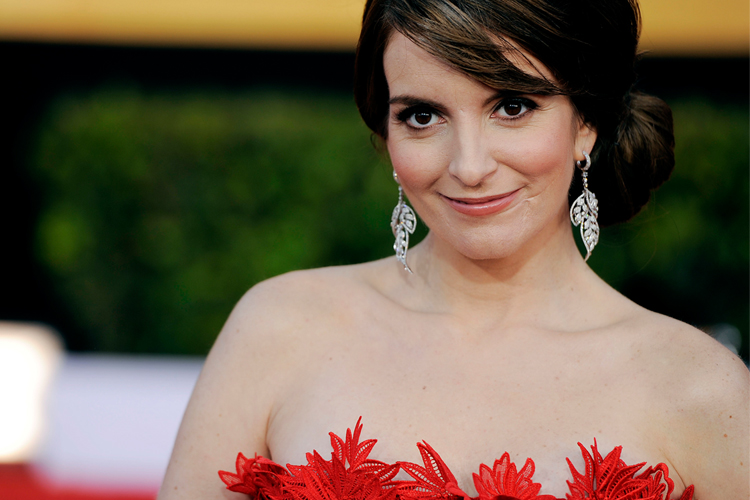Tina Fey’s great appeal has always been her ability to wrap all that razor-sharp wit, intelligence and beauty in the guise of a regular gal you could easily imagine eating nachos with in your sweat pants. Fey isn’t like the rest of us mere mortals, of course. She’s a Mark Twain prize– and multiple Emmy and Golden Globe winner, a woman who’s appeared on the cover of Vanity Fair and Rolling Stone, and, as her brutally funny, uncharacteristically candid essay in this week’s New Yorker reveals, a woman who can unpack the travails of a working mother with more heart, soul and righteous indignation than a a boatload of Caitlin Flanagans and Lisa Belkins.
Despite the intensity of her work — from her scathing Sarah Palin to the biting jibes about race and gender that make “30 Rock” indispensable — Fey has rarely mined the rich, often terrible fodder that the day-to-day grind of parenting provides. Her television alter ego Liz Lemon has a pathetic romantic life and a baby fever that’s going nowhere. The only occasional voice of parental frustration on the show comes from Liz’s married-with-five-kids colleague Pete, who fantasizes about stealing his dead neighbor’s identity, “because sometimes it feels like too much and maybe Daddy just needs to get in the car and drive.” (If you desire a realistic, non-“Two and a Half Men” version of what raising kids is like, you really need to be watching “Louie.”)
Perhaps it’s because Fey’s costar Jane Krakowski is pregnant, or her “SNL” and “Baby Mama” costar Amy Poehler welcomed a second child last year, that she felt the need to write with such frankness about her relationship with her 5-year-old daughter, Alice, and the will-she-or-won’t-she? mystery of whether to have a second child. It’s a move she acknowledges would mean “derailing the TV show where two hundred people depend on me for their income, and I take that seriously.” And she understands intimately that that’s a business decision no male prospective parent ever has to make.
Though few of us working mothers have to worry about how our fertility will affect a beloved television network franchise, Fey’s internal anguish and external pressures to “have another one” are familiar to many of us. She opens her essay with her daughter bringing home a copy of the storybook “My Working Mother,” a whimsical tale of a witch’s child who admits, “It isn’t easy having a working mom. Especially when she enjoys her work.” Yes, kids, it’s true: The only thing harder than a mom who has to work is one who actually likes to work. A few years ago, when I wrote what would be the last story I’d write for a parenting magazine, an editor changed a source’s quote from “I love my job and I love my kids” to “I like my job, but I love my kids.” God forbid you have more than one passion in life. How do you, as Fey writes, answer the skeptics who accusingly ask how you “juggle it all”? (Hint: They don’t believe you can. They’ll urge you to keep reproducing and judge you for still having a vocation.)
As it happens, I know “My Working Mother” well; my own young daughter pointedly selected it the last time we went to Books of Wonder. I know what it’s like to have a kid who says, as witch’s sprog does, “I don’t always like having a working mom.” It sucks, even though, as Fey says, “I’m sure the two men who wrote this book had the absolute best intentions.”
Like that broomstick-flying heroine of the children’s story, Fey also likes her work. And she’s blazing at it, which is where the rub comes in, because she says she always assumed her show would have been canceled by now. Instead, she now finds herself in what she self-deprecatingly refers to as her “last five minutes.” As in last five minutes of fame. Last five minutes of fertility. The cruelest joke of all is the one made by biology. And for many women, the apex of their careers coincides neatly with the waning of their fecundity. What’s a mother to do, when no matter how equitable and awesome the family may be, no one will ever write a book about how difficult it is to have a dad who holds down a job?
So it’s terrific to read another mother admitting her anguish over “this second baby nonsense.” “Am I just chasing it because it’s the hardest thing for me to get and I want to prove that I can do it?” she writes. “Do I want another baby? Or do I just want to turn back time and have my daughter be a baby again?” And she’s open about the very real career danger of a woman in show business suddenly going AWOL and finding herself the subject instead of the source of the punch line. As she brutally puts it, “The definition of ‘crazy’ in show business is a woman who keeps talking even after no one wants to fuck her any more.”
Yet as the sands of time slip through the hourglass and those incredibly nosy helpy helpertons advise, as they do Fey, “You should have another one,” somehow the world turns on, often quite well anyway. We can be paralyzed by choice, but life will make choices for us regardless. In the end, Fey admits that “Either way, everything will be fine,” which is possibly the most hopeful and encouraging thing any working mother could say to another. And there’s something pretty wonderful about having America’s best girlfriend admit she’s got her eggs in the same basket as the rest of us.


